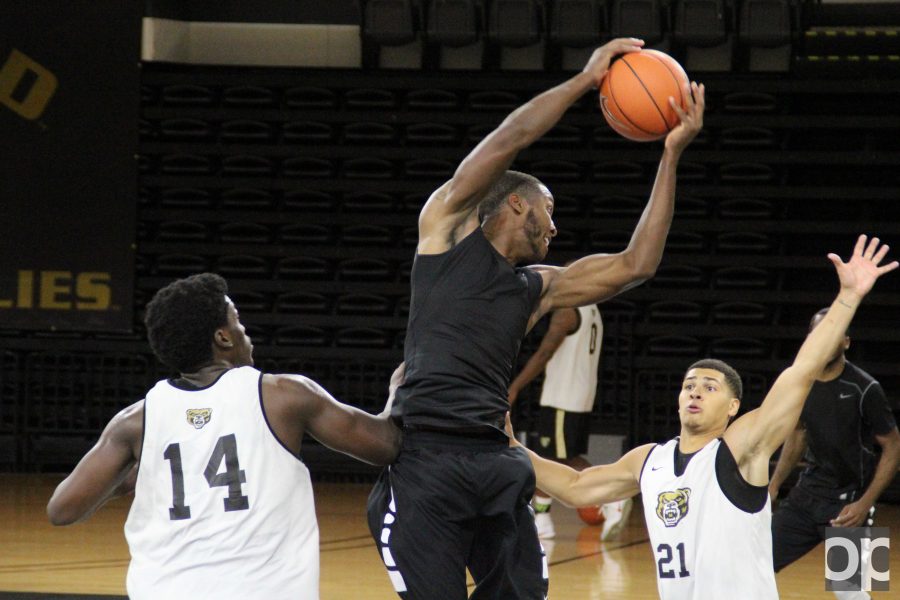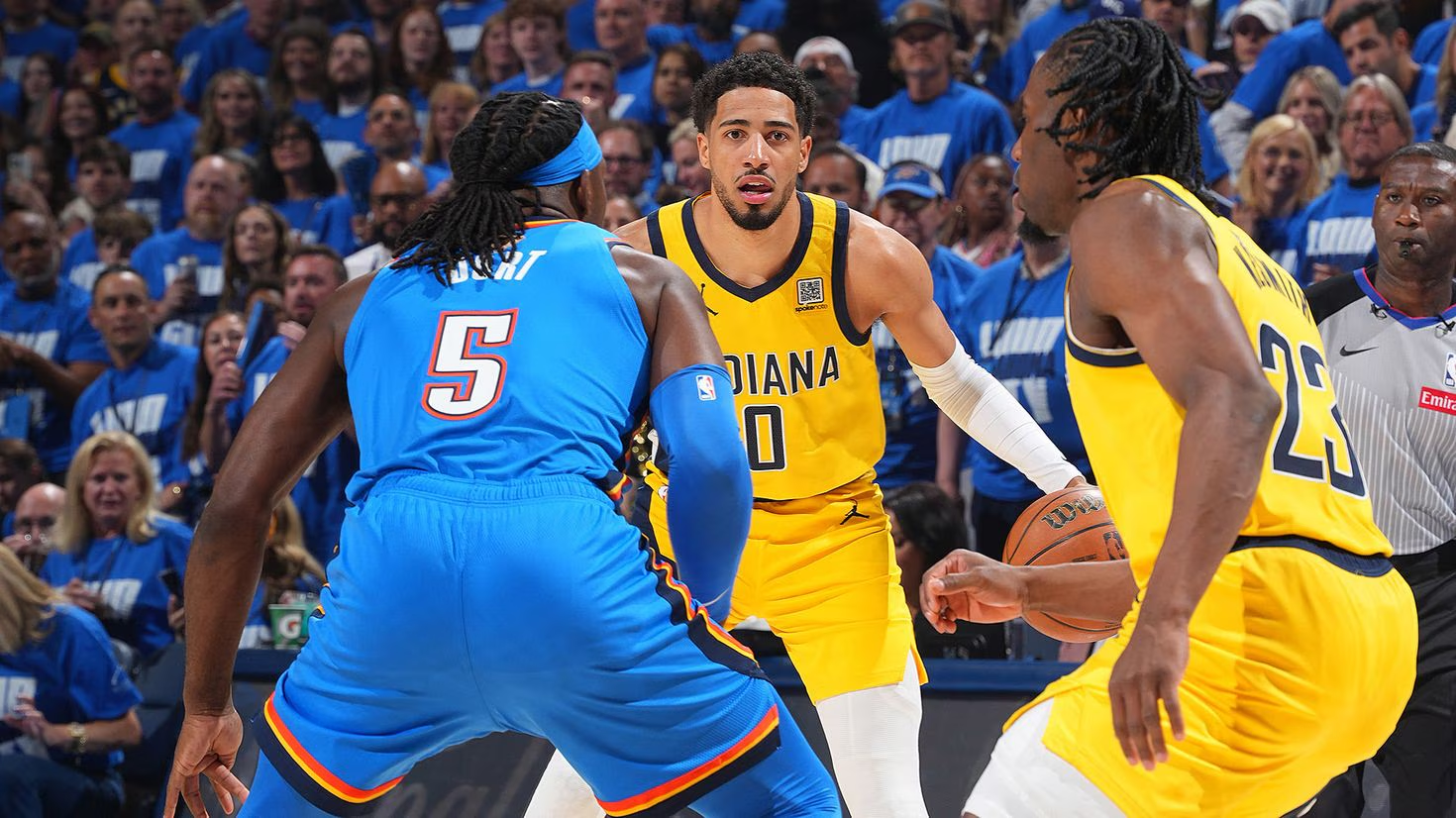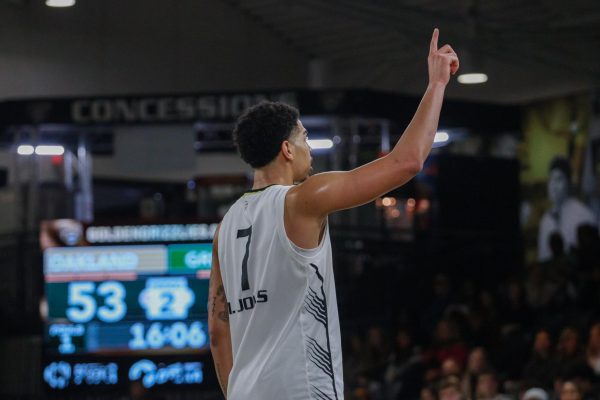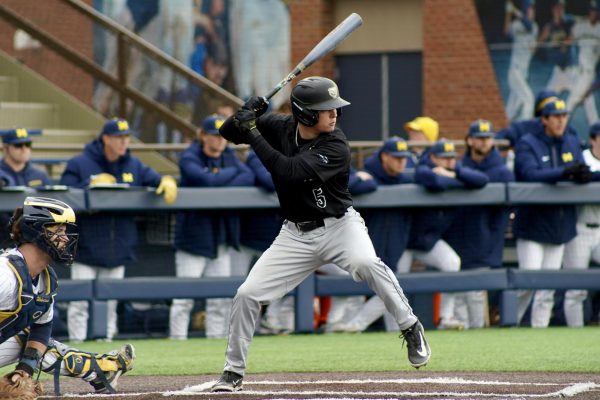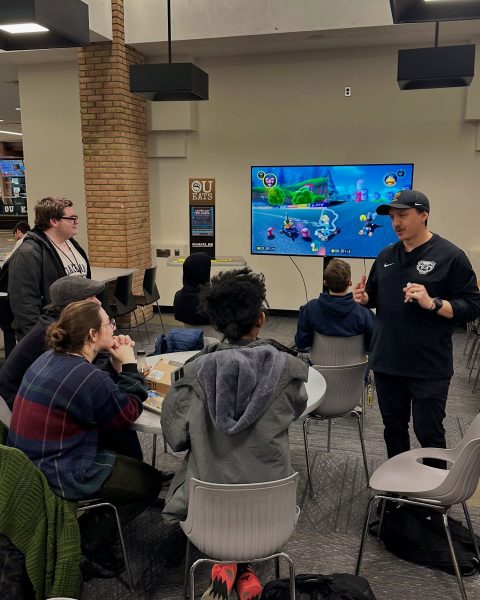NCAA denies vet opportunity to play
Oakland appealing organization’s decision to keep Isaiah Brock from competing
Isaiah Brock practices with teammates Monday, Oct. 10, at the O’rena.
The NCAA has rejected Army veteran Isaiah Brock’s waiver to compete for Oakland men’s basketball this season. The university is appealing the NCAA’s decision, which Oakland men’s basketball head coach Greg Kampe became aware of on Sept. 30.
“Isaiah Brock did not meet initial eligibility standards based off his high-school transcript in 2011,” said Jeff Konya, Oakland’s athletic director. “Therefore, we had to ask for a waiver because he was deemed a non-qualifier, and we asked for him to receive athletic financial assistance, for him to practice and for him to compete.”
Oakland’s pitch invoked the 22-year-old’s Army service, personal growth and four college classes that he has passed. The NCAA allowed him to practice and receive athletic financial assistance, but not to compete.
“It wasn’t an ultimate rejection,” Konya said.
Oakland has one chance to appeal. The university’s basic argument is still the same: Based on the time passed, life lived and learned, and four college classes completed since high school, the initial eligibility requirements shouldn’t apply to Brock like they do to a student-athlete coming straight from high school.
“We have to enhance and strengthen our arguments that we put in the initial waiver,” Konya said. “We have to comb through his story to make sure that we don’t leave any rock unturned that could assist in telling the story of who Isaiah Brock in 2016 is.”
Oakland then must collaborate with the NCAA to work out what Brock’s competitive eligibility will be. Konya expects the appeal will be filed before Thursday, Oct. 13. With the men’s basketball season beginning Nov. 7, he thinks the matter will be processed quickly.
“We are working with the NCAA right now,” Konya said. “We are trying to get to a result with them. They are in contact with us as we prepare the appeal.”
The official appeal is an online form, but a case manager will also work with Oakland to examine submitted materials. As of Thursday, Oct. 6, the case manager had not met Brock, nor had the NCAA requested to interview him.
“We thought the waiver was a slam dunk,” Kampe said. “Turns out it’s not.”
The competition waiver would be more than minutes and TV time, he said.
“Being allowed to play means you can travel, you can experience college basketball,” Kampe said. “You warm up for the game, you can dress . . . If he were 18 years old, OK, no big deal. But he’s 22. When he graduates, he’s going to be 26. Why should he come back for 27? It’s time to get on with your life at 27.”
The Golden Grizzlies play a closed scrimmage against Central Michigan University on Halloween, and Kampe wants a yes or no by then.
“My question is, what’s it hurting?” Kampe said. “It’s 100 percent evident that he’s academically prepared to be a student-athlete.”
Brock’s story is what you want in the NCAA, he said.
“Right now, in this day and age, everybody’s talking about how veterans are treated so poorly when they come back,” Kampe said. “Here’s the NCAA’s chance to stand up to that and give him special consideration, thank him for what he did for our country.”
Brock is an exception to the initial eligibility rules, he said.
“He needs to be made whole,” Kampe said. “He needs to be allowed to participate and experience college basketball.”
Brock found out that he wouldn’t be able to compete this season through a phone call from Kampe. In its partial rejection, the NCAA did not mention his military service or the college courses he has taken, Brock said.
“Definitely disappointed,” he said. “[Filing the waiver] was a long, strenuous process. I wrote a lot of letters to them explaining that I was worthy of the opportunity to play here, go to school here. For them to deny me, I was just devastated. I didn’t know what to say.”
But there is nothing for him to do, except appeal.
“I have faith in the process,” Brock said. “I’m just going to continue to work hard out here on the court every day and [go] hard in the gym.”
On top of the letters he’s written, what does he want to say to the NCAA?
“I would just like to tell them that I’m worthy of this opportunity, and I definitely won’t disappoint them,” Brock said. “I understand what happened in high school. I was young and immature at the time, but going in the military, taking those few college courses, coming here, really changed me as a person and helped me mature as a man.”
Brock didn’t focus on his studies in high school, the Detroit Free Press reported, which is why, for him, his 2011 high school transcript is an inconvenient reference point for NCAA eligibility. But when Brock was in the Army serving as a mortuary affairs specialist, he noticed himself changing.
“The experiences I was going through while deploying, or just day-to-day life in the Army, I was definitely starting to pick up things,” Brock said. “My mind was definitely maturing. I was starting to actually think like an adult instead of a child.”
Kampe brought Brock on the squad primarily for this life experience, to bring some additional leadership to the team.
“He’s had tremendous impact,” Kampe said. “He’s on the [Student-Athlete Advisory Committee]. He’s already tutoring . . . He’s got life experiences that no one else has and that our kids can talk to him about. It’s been everything I wanted it to be.”
Brock took some classes with other freshman student-athletes over the summer.
“They’re trying to get in the groove of things,” he said. “I stayed on their back, made sure they were doing their work, motivating them every day to do the right thing and get good grades, compete in practice.”
But he said the team is pretty self-motivated. Besides, the younger guys are not the only ones learning something. Brock has never played college basketball.
“I’m going to . . . soak up all the knowledge I can from these guys, no matter if they’re young or if they’re older than me,” Brock said. “If you know something I don’t know, I want to know.”
Brock is pursuing a psychology degree and has four years of athletic eligibility remaining. If the NCAA denies the appeal, he would have to wait till next year to compete.
“I would sit on the sideline, cheer my team, go hard in practice, compete everyday,” Brock said. “It would just make me work harder.”
The NCAA has not responded to The Post’s requests for comment.



